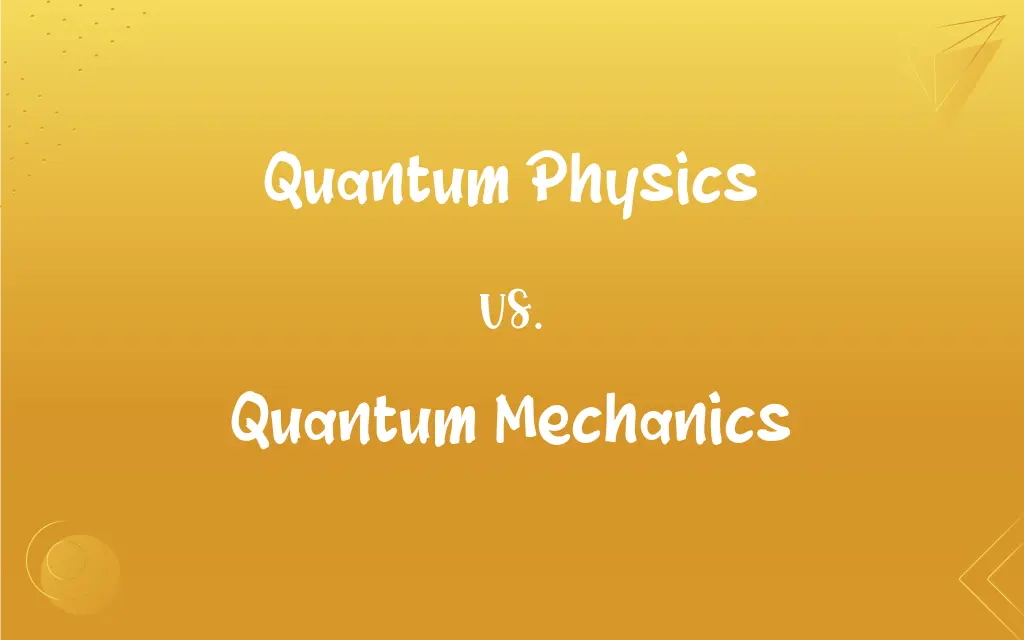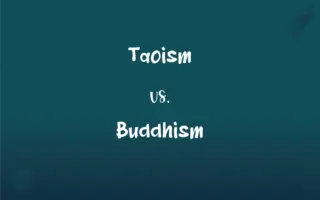Quantum Physics vs. Quantum Mechanics: What's the Difference?
Edited by Aimie Carlson || By Janet White || Published on January 27, 2024
Quantum physics is the broad field studying the behavior of matter and energy at quantum scales, while quantum mechanics is the theoretical framework within this field.

Key Differences
Quantum physics encompasses the overall study of the smallest particles of matter and their interactions at the subatomic level. Quantum mechanics, a subset of quantum physics, is a fundamental theory that provides a mathematical framework to describe these phenomena.
Quantum physics covers various aspects like particle physics, quantum field theory, and quantum technologies. Quantum mechanics, specifically, deals with the principles like wave-particle duality, uncertainty principle, and superposition.
Quantum physics is a broad term that includes all quantum phenomena and their applications, while quantum mechanics refers to the specific models and theories that explain these phenomena.
Quantum physics can involve experimental research and applied physics, focusing on how quantum phenomena can be utilized. Quantum mechanics is more about theoretical understanding and mathematical formulations.
Quantum physics is the larger scientific domain that quantum mechanics falls under, with the latter providing the core theoretical concepts for understanding quantum behavior.
ADVERTISEMENT
Comparison Chart
Scope
Broad field of study including all quantum phenomena
Specific theoretical framework within quantum physics
Focus
Encompasses theory, application, and experimentation
Primarily focused on mathematical models and principles
Examples
Particle physics, quantum computing
Schrödinger equation, Heisenberg uncertainty principle
Application
Broader applications in technology and research
Specific to explaining quantum behavior and systems
Relation
General field
Subset or part of quantum physics
ADVERTISEMENT
Quantum Physics and Quantum Mechanics Definitions
Quantum Physics
The study of matter and energy at the smallest scales.
Quantum physics has revolutionized our understanding of the atomic world.
Quantum Mechanics
Explains interactions and properties of particles at quantum scales.
Quantum mechanics helps in understanding chemical bonding at a molecular level.
Quantum Physics
Encompasses various theories and applications of quantum phenomena.
Developments in quantum physics are leading to breakthroughs in quantum computing.
Quantum Mechanics
Focuses on principles like uncertainty and wave-particle duality.
The uncertainty principle in quantum mechanics challenges classical physics notions.
Quantum Physics
A field that includes both theoretical and experimental aspects.
Research in quantum physics has expanded our knowledge of particle behavior.
Quantum Mechanics
A mathematical approach to understanding quantum phenomena.
Quantum mechanics uses complex equations to describe quantum states.
Quantum Physics
Broadly covers areas like quantum field theory and quantum technology.
Advances in quantum physics are integral to developing new technologies.
Quantum Mechanics
Involves models like Schrödinger’s equation and quantum fields.
Schrödinger's equation in quantum mechanics is fundamental to quantum theory.
Quantum Physics
Investigates the nature and behavior of subatomic particles.
Quantum physics explains phenomena that classical physics cannot.
Quantum Mechanics
The theoretical framework in quantum physics describing particle behavior.
Quantum mechanics provides a way to predict the behavior of electrons in atoms.
FAQs
Is quantum mechanics purely theoretical?
Largely, but its principles are essential for practical applications in quantum physics.
What is quantum physics?
The study of matter and energy at the smallest, quantum scales.
What are key concepts in quantum mechanics?
Wave-particle duality, superposition, and uncertainty principle.
How does quantum mechanics fit into quantum physics?
It's a theoretical framework within quantum physics for understanding particle behavior.
Can quantum mechanics predict exact outcomes?
It often predicts probabilities rather than exact outcomes.
How important is mathematics in quantum mechanics?
Crucial, as it relies heavily on mathematical formulations.
Can quantum physics be applied in technology?
Yes, in fields like quantum computing and quantum communication.
Is quantum computing a part of quantum physics?
Yes, it's an application of quantum physics principles.
Can quantum mechanics explain gravity?
Not yet fully; integrating gravity with quantum mechanics is a significant challenge.
Do quantum physics and classical physics agree?
They differ significantly, especially at the quantum scale.
How do quantum mechanics and relativity theory relate?
They are both fundamental theories in physics but operate at different scales and contexts.
What does the uncertainty principle state?
It indicates that certain pairs of properties cannot be precisely measured simultaneously.
Is quantum teleportation a part of quantum mechanics?
Yes, it's a theoretical concept within quantum mechanics.
What's an example of a quantum physics discovery?
The development of quantum field theory.
Are quantum physics and quantum mechanics used interchangeably?
Sometimes, but they have distinct meanings.
How does quantum mechanics impact our understanding of the universe?
It provides a deeper understanding of the fundamental nature of reality.
Can anyone study quantum physics?
Yes, though it requires a strong background in mathematics and physics.
What role does observation play in quantum mechanics?
Observation is key, as it can affect the state of a quantum system.
What practical devices use quantum mechanics?
MRI machines and lasers are based on principles of quantum mechanics.
How does quantum mechanics challenge classical intuition?
By showing that particles can exist in multiple states simultaneously, defying classical logic.
About Author
Written by
Janet WhiteJanet White has been an esteemed writer and blogger for Difference Wiki. Holding a Master's degree in Science and Medical Journalism from the prestigious Boston University, she has consistently demonstrated her expertise and passion for her field. When she's not immersed in her work, Janet relishes her time exercising, delving into a good book, and cherishing moments with friends and family.
Edited by
Aimie CarlsonAimie Carlson, holding a master's degree in English literature, is a fervent English language enthusiast. She lends her writing talents to Difference Wiki, a prominent website that specializes in comparisons, offering readers insightful analyses that both captivate and inform.































































